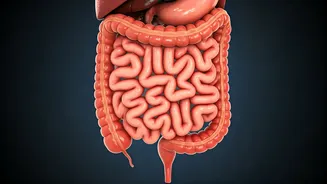Understanding Constipation
Constipation, typically defined by infrequent bowel movements or difficulty passing stools, can result from various factors. Often, changes to diet such
as increased fiber intake, or even increased water consumption, can sometimes exacerbate the problem initially before the body adjusts. Other underlying causes could include dehydration, a lack of physical activity, or certain medications. It’s also crucial to consider lifestyle aspects, as stress and changes in routine can impact the digestive system. If constipation persists despite lifestyle adjustments, it’s advisable to consult a healthcare provider. They can assess for underlying medical conditions or offer specific treatments like laxatives or stool softeners, helping to bring your system back to normal and supporting overall wellness.
Fiber's Double Edge
While fiber is celebrated for aiding digestion, its effects can be paradoxical. A sudden increase in fiber intake, particularly without adequate water, can initially worsen constipation. This is because fiber absorbs water and expands in the intestines, potentially creating bulkier stools that are harder to pass if hydration is insufficient. It is crucial to gradually increase fiber consumption to allow your body to adjust. Start with small portions of high-fiber foods such as fruits, vegetables, and whole grains. Alongside fiber, make sure to drink plenty of water throughout the day. Water keeps the stool soft and helps it move efficiently through your digestive tract. This combination ensures that the fiber works as intended, promoting regularity rather than causing discomfort.
Hydration's Vital Role
Water is a cornerstone of digestive health. It facilitates the movement of food through the intestines and keeps stools soft. Dehydration is a common cause of constipation, as the colon absorbs water from the stool to compensate for the body's fluid deficit, leading to harder, more difficult-to-pass stools. Aim to drink at least eight glasses of water daily, and increase intake if you’re physically active or in a hot climate. Be mindful of signs of dehydration such as dark urine, and fatigue. In addition to plain water, herbal teas, and hydrating fruits and vegetables, like cucumbers and watermelon, can contribute to your daily fluid intake. Consistently staying hydrated ensures smooth bowel function and supports overall well-being, helping to prevent constipation before it starts.
Exercise and Movement
Regular physical activity plays a critical role in promoting healthy digestion. Exercise stimulates the muscles in your intestines, thereby facilitating the movement of food. Even moderate activities like walking can make a difference. Aim for at least 30 minutes of moderate-intensity exercise most days of the week. Consider incorporating activities like jogging, swimming, or cycling into your routine. Consistent movement helps to reduce the time it takes for food to pass through the digestive system and minimizes water absorption from the stools, preventing them from becoming dry and hard. If you're struggling with constipation, consider taking short walks after meals. This can often help trigger bowel movements naturally. Combining exercise with a high-fiber diet and adequate hydration creates a powerful trifecta for regular bowel movements and overall gut health.
Dietary Adjustments
Dietary choices significantly affect bowel regularity. A balanced diet rich in fiber is fundamental, but also consider the types of foods you are consuming. Incorporate foods high in soluble fiber, which absorbs water and adds bulk to stools, and insoluble fiber, which aids in moving waste through the intestines. Excellent sources of fiber include fruits (apples, berries), vegetables (broccoli, spinach), whole grains (oats, brown rice), and legumes (beans, lentils). Reduce intake of processed foods, which often lack fiber and contain additives that can disrupt digestive processes. Consider incorporating natural laxatives into your diet, such as prunes, figs, and chia seeds, which can help stimulate bowel movements. By carefully selecting and combining your foods, you can take control of your digestive health and significantly reduce the likelihood of constipation.
Medical Considerations
If constipation persists despite lifestyle changes, or if you experience severe symptoms like abdominal pain, rectal bleeding, or unexplained weight loss, it's time to consult a doctor. These symptoms could signal more serious underlying conditions. Your doctor may perform a physical examination or order tests like blood tests, stool tests, or imaging scans to identify the root cause of the constipation. They may suggest over-the-counter or prescription medications like stool softeners, osmotic laxatives, or stimulant laxatives to provide relief. Never self-medicate, especially if your symptoms are concerning. They might also explore dietary adjustments beyond the basics, recommend probiotics to improve gut health, or even refer you to a gastroenterologist for further specialized evaluation and care.













